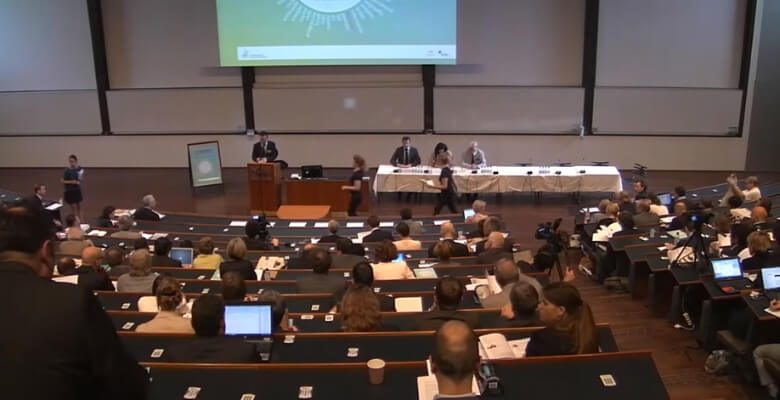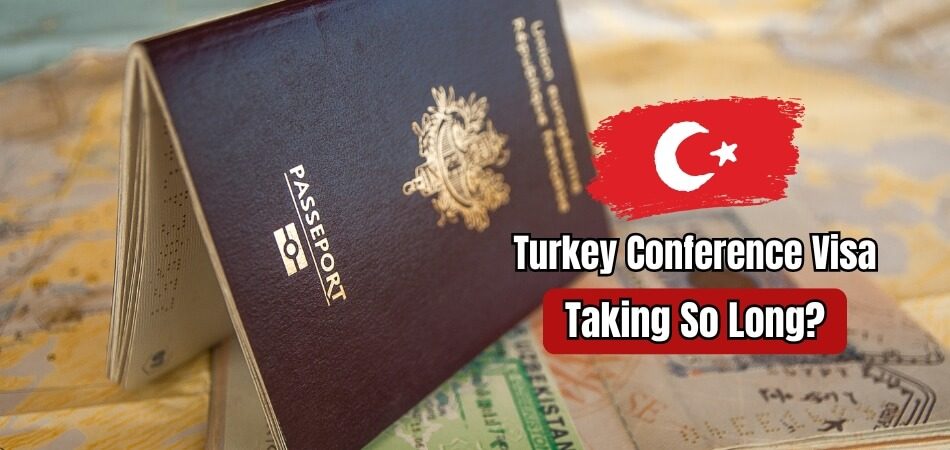The opportunity to attend a conference in Turkey can be exciting for professionals and academics alike. It offers a platform for networking, learning, and cultural exchange.
However, many attendees face a common obstacle, delays in obtaining a conference visa. This raises the pressing question, “Why is the Turkey conference visa taking so long?”
Extended waiting times can be attributed to several factors, such as a surge in applications, heightened security measures, and administrative backlogs. With processing durations fluctuating from a few weeks to a few months, applicants are often left uncertain.
As we go through this article, we’ll probe into these reasons in detail, offering insights into the complexities of the visa process for Turkey. Join us as we explore what you can do to address these challenges and ensure your travel plans remain on track.
The Purpose of the Turkey Conference Visa
The Turkey Conference Visa serves a specific purpose for individuals looking to attend professional gatherings, seminars, workshops, or conferences in Turkey. Understanding this visa’s importance can help ensure a smooth and enjoyable experience during your visit. Here’s a breakdown of its primary purposes.

Key Purposes of the Turkey Conference Visa are stated below.
Facilitates Attendance at Professional Events
The primary function of this visa is to allow individuals to participate in various professional events. Whether you’re a speaker, attendee, or organizer, the visa ensures that you can legally engage in these activities.
Official Recognition
The Turkey Conference Visa provides official recognition from the Turkish government that you are permitted to enter the country for specific professional activities. This legal backing is essential for a hassle-free experience at your event.
Short-Term Validity
Typically, this visa is valid for the duration of the conference or event. For instance, attending a Conference in Turkey 2024 with invitation letter grants you the necessary legal status to participate fully in the activities planned.
Networking Opportunities
Attending a conference in Turkey opens the door to networking with professionals from various fields. The visa enables you to connect with industry leaders, share ideas, and explore potential collaborations, which can be invaluable for your career.
Cultural Exposure
Beyond professional development, the visa also allows you to immerse yourself in Turkey’s rich culture and history. This experience can broaden your mind and provide a more rounded perspective on your field of expertise.
Why is The Turkey Conference Visa Taking So Long?
A trip to Turkey can be an exciting experience for many, providing an opportunity to grow professionally while absorbing the rich cultural heritage of the region. The majority of potential attendees, however, inquire, “Why is the Turkey conference visa taking so long?”
A multitude of factors, such as a high volume of applications, stringent security checks, and administrative delays, play a role in this extended processing time. These elements ensure the safety and management of incoming visitors.
However, they can vary significantly depending on individual circumstances and the specific consulate or embassy’s current workload. Here are the details about these factors.
High Volume of Applications
Explanation: During peak travel seasons or around major conferences, the number of visa applications can surge significantly. This increased volume puts a strain on the processing capacity of embassies and consulates, leading to longer waiting times for approvals.
For instance, if a popular international conference is scheduled, many attendees will be applying for visas simultaneously, causing a backlog in processing.
Impact: If you’re applying during a busy period, it’s advisable to submit your application well in advance to account for potential delays. Aim to apply at least several weeks, if not months, before your intended travel dates.
This is especially important to keep in mind as Turkey conference visa processing time can vary significantly during busy months.
Incomplete or Incorrect Documentation

For instance, a missing invitation letter from the conference organizer could lead to immediate rejection or a request for resubmission.
Impact: It’s crucial to double-check your application and ensure that all required documents are correctly filled out before submission. A thorough checklist of all necessary documentation can help ensure that you don’t overlook any details.
Security Checks and Background Verification
Explanation: The Turkish government conducts thorough security checks and background verifications for all visa applicants. These checks are essential for national security and may involve additional scrutiny, especially for applicants from certain countries with high-risk profiles.
The verification process includes cross-checking your information against various databases, which can take time.
Impact: If your application raises any flags during the security check, it may take longer to resolve, resulting in a delay. To mitigate this risk, be transparent and honest in your application, and ensure that all your documentation reflects your true intentions for visiting Turkey.
Changes in Visa Policies
Explanation: Occasionally, changes in visa policies or regulations can occur, affecting processing times. This can include new documentation requirements, eligibility criteria, or processing fees.
For example, if new regulations are introduced to enhance security or streamline the process, it may take time for the authorities to adapt to the new policies, leading to delays in processing times.
Impact: If you apply when there are recent changes, it may take time for the authorities to adapt to the new policies, potentially causing delays. Keeping informed about the latest updates from the Turkish consulate or embassy can help you stay ahead of any potential issues.
Embassy or Consulate Backlogs
Explanation: Sometimes, embassies or consulates may experience backlogs due to staffing shortages, unforeseen circumstances (like public holidays), or system upgrades. These backlogs can significantly extend the time it takes to process visa applications.
If multiple holidays coincide with a busy travel season, the effect on processing times can be compounded.
Impact: If your application is stuck in a backlog, it’s challenging to predict how long it will take. Keeping communication open with the embassy can help you stay informed about your application status. Consider contacting them periodically to check on the progress of your application.
Interviews and Additional Requirements
Explanation: Some applicants may be required to attend an interview or provide additional documents after submitting their initial application. This step can introduce delays, especially if scheduling an interview takes time.
If you’re required to provide more information or clarify your purpose of visit, the additional processing time can extend your wait.
Impact: Be prepared for the possibility of an interview and ensure you can provide any extra information requested promptly. Research common interview questions and be ready to explain your reasons for attending the conference clearly.
Technical Issues
Explanation: Technical problems can arise during the online application process or while processing the applications at the consulate or embassy. Issues like system downtime, data entry errors, or connectivity problems can contribute to delays.
For instance, if the online portal experiences outages or slowdowns, it may hinder the processing of applications.
Impact: Staying patient and persistent can help you navigate any technical challenges that may arise. If you encounter issues with the online application system, don’t hesitate to reach out to customer service for assistance.
Inadequate Preparation
Explanation: If applicants do not have a clear understanding of what is needed for their conference visa application, they might not submit all the required documents or meet eligibility criteria. This can lead to complications and delays.
A lack of preparedness may stem from unfamiliarity with the application process or neglecting to research the necessary documentation.
Impact: Researching the specific requirements for a Turkey Conference Visa ahead of time can save you from unnecessary delays. Consult official resources or reach out to those who have successfully navigated the process to gain insights.
It can be frustrating if you are not able to determine the reason for the delay in your project. The process is part of ensuring every attendee arrives in Turkey with the right credentials and security clearances. You can mitigate some of these delays by planning and applying early.
What Should You Do While the Turkey Conference Visa Delays?
When planning your trip to a conference in Turkey, facing delays in your visa processing can be disheartening. It’s important to remain proactive and patient. While it’s easy to feel stuck during this waiting period, there are several steps you can take to ensure you’re prepared once your visa is approved.
Step 1: Stay Informed
Regularly check your email and the visa application portal for any updates or requests for additional information. The consulate may need more documents to proceed with your application, and quick responses can help expediting Turkey visitor visa process.
Additionally, keeping in touch with the consulate or your visa agent can provide you with up-to-date information on the status of your application.
Step 2: Prepare Your Travel Plans
Use this time to refine your travel itinerary. Confirm your accommodation, arrange transportation within Turkey, and plan your schedule around the conference. Having these details sorted out in advance will make your trip smoother once your visa is issued.
Also, consider travel insurance that covers trip cancellations or delays to safeguard your investments.
Step 3: Gather Conference Materials
Start gathering or preparing any materials you might need for the conference, such as presentations, business cards, or promotional materials. This preparation not only ensures you are ready to go once your visa is approved but also helps to divert your attention from waiting and reduces last-minute packing stress.
Tips for Processing Turkey Conference Visa Without Delay
How to manage the visa application process for a conference in Turkey doesn’t have to be stressful. With some foresight and strategic planning, you can simplify the process and minimize delays. Here are some practical tips to secure your Turkey conference visa smoothly and efficiently.
- Apply Early: Submit your application well ahead of your travel date to avoid peak times and possible delays.
- Complete Documents: Ensure all required documents are complete, accurate, and neatly organized.
- Follow Instructions: Adhere strictly to the visa application instructions provided by the Turkish consulate.
- Check Visa Type: Confirm you are applying for the correct type of visa specific to conferences.
- Prepare for Fees: Have payment ready for any visa processing fees, which can sometimes be required upfront.
- Use Clear Copies: Provide clear photocopies of all documents, as illegible submissions can cause delays.
- Provide Proof of Affiliation: Include evidence of your affiliation with the conference, like invitation letters or registrations.
- Stay Updated: Keep yourself updated on any changes in visa regulations or procedures by checking the consulate’s website regularly.
Frequently Asked Questions
Getting through the visa process for Turkey can be straightforward, but it’s essential to stay informed about potential delays and requirements. You need to understand some common concerns to avoid pitfalls along the way. Here are some frequently asked questions to clarify the process and enhance your experience:
How Long Does it Take For a Turkey Visa To Be Approved?
For tourist and business visas, the typical processing time is about 15 days. However, student and work visas generally take longer, averaging around 25 days for approval. It’s advisable to apply well in advance to accommodate any potential delays.
How Long Does a Turkey E-Visa Take to Process?
The e-visa for Turkey is designed for convenience and is usually processed very quickly, typically within 1-2 days. This fast turnaround makes it an excellent option for travelers needing immediate access to Turkey. Always check the official e-visa website for the most current processing times.
Is a Turkey Visa Difficult To Get For Indians?
Obtaining a Turkey visa is relatively easy for Indian citizens, especially with the availability of both e-visas and sticker visas. The application process is straightforward, and many applicants find it manageable. However, ensuring that all required documents are submitted correctly is crucial for a smooth experience.
What Factors Can Delay The Processing of a Turkey Conference Visa?
Delays in conference visa processing can arise from various factors, including high application volumes during peak conference seasons. Additional security checks or missing documentation can also extend the processing time. To avoid delays, ensure all paperwork is complete before submission.
How Can I Check The Status of My Turkey Conference Visa Application?
Applicants can usually check the status of their visa application through the official Turkish visa website. Alternatively, you can contact the consulate where you submitted your application for updates. Keeping track of your application status can help you plan your travel more effectively.
What Should I Do if My Turkey Conference Visa is Delayed?
If your visa is delayed, it’s important to stay in communication with the consulate for updates. Double-check that all your submitted documents are correct and complete to avoid further issues. Be prepared to provide additional information if requested, as this can help expedite the process.
Can Expedited Processing be Requested For a Turkey Conference Visa?
Some consulates may offer expedited processing for an additional fee, depending on their policies. However, availability and criteria for expedited service can vary, so it’s advisable to check directly with the consulate. Being proactive in your inquiry can save you valuable time.
What are the Common Reasons For a Turkey Visa Rejection?
Visa rejections can occur for several reasons, including incomplete application forms or a lack of necessary documents. Insufficient proof of financial means or previous immigration violations can also lead to denial. To minimize the risk of rejection, ensure that your application is thorough and meets all requirements.
End Reflection
An applicant’s grasp of the underlying reasons behind a delay in processing a Turkish conference visa can be extremely important. The question “Why is the Turkey conference visa taking so long?” often arises due to factors like high application volumes, extensive security checks, and administrative delays.
These elements ensure thorough scrutiny and processing, which, while maintaining safety and compliance, can extend wait times. Applicants can enhance their chances of a smoother process by applying early. They can also ensure their documentation is complete and accurate, as well as stay informed about any updates from the consulate. Patience and preparation are key to success.






